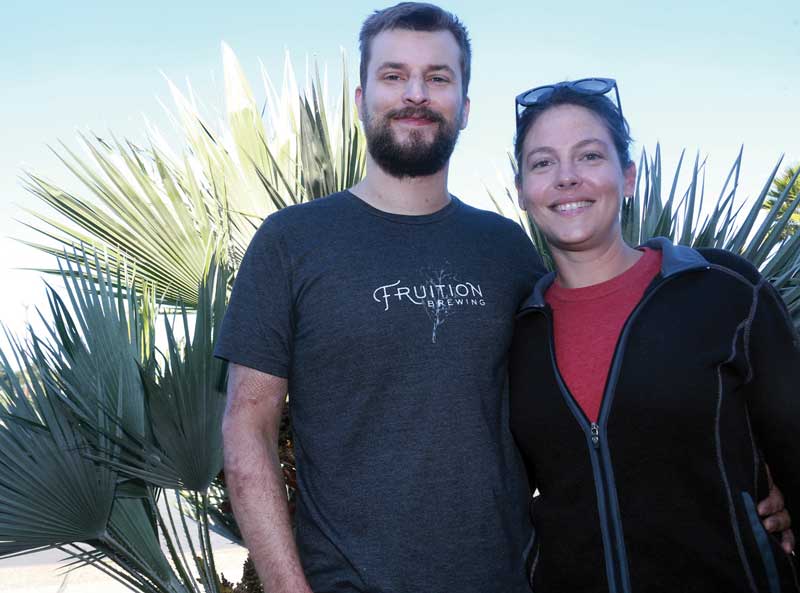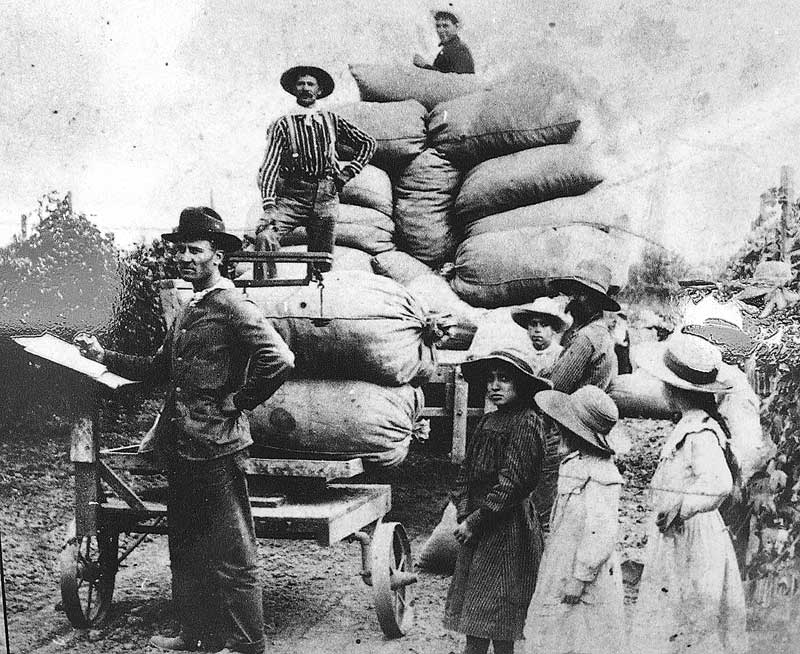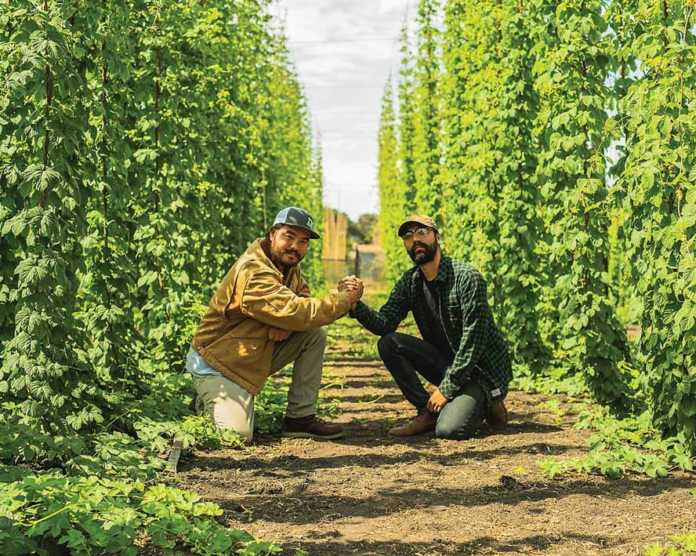Editor’s note: Brewing Change is a two-part series on the growing craft brew scene in Watsonville.
WATSONVILLE — When Sam Akiyama returned home from college in 2015, he knew he wanted to continue his family’s tradition of small family farming.
He didn’t know he would need to reinvent it.
After building a carnation empire just outside of Watsonville over the last 43 years, his grandparents, Kiiko and Isamu, and father, Ben, were forced to call it quits. The carnation market had dried up, and the once proud nine-acre nursery — the last of its kind in the United States — folded.
The family business needed a new identity in order for it to survive, and Akiyama decided to bring it into the future by tapping into the burgeoning business of craft beer. More specifically, the crop that fuels the trade: hops.
Over the last three years, Akiyama has slowly rekindled his family’s success by turning the former nursery into a three-acre hop farm, the Akiyama Hopyard. This fall, Akiyama and his business partner Jorge Vasquez sold all of the hops — in the thousands of pounds — produced in their third season. Their clients? Peter B’s Brewpub, The Rare Barrel, Yeast of Eden, Shanty Shack Brewing, Humble Sea Brewing Co., Elkhorn Slough Brewing and Uproar Brewing Company.
“I didn’t want to see [the family farm] slip away,” Akiyama said. “I tried to find something to do to rebuild all of that, and it seems like this was the answer … The market was open.”
Akiyama and Vasquez are not the only people jumping head first into the blossoming craft brew scene in Watsonville.
Beer Thirty owners Kym and Shawd DeWitt, Olive Moredock and Craig Renfroe are weeks away from opening Beer Mule Bottle Shop — a tap house that will mimic the successful Soquel business — on 145 Aviation Way in Watsonville. Elkhorn Slough Brewing Co. on Hangar Way and Corralitos Brewing Co. just outside of city limits are thriving. And, perhaps the most awaited addition to the brew landscape in south Santa Cruz County, Fruition Brewing is hoping to join a renaissance in the East Lake Village Shopping Center when it opens some time in the next six months.
Fruition co-owners David Purgason and Tallula Preston are working feverishly to bring their dreams to, well, fruition.
After three years of searching up and down the county for a suitable location to share their homebrewing operation with the public, the duo found a promising 4,440-square-foot site in a city that has recently tried to become a paradise for craft breweries.

David Purgason and Tallula Preston are the co-owners of Fruition Brewing, which plans to open in the East Lake Village Shopping Center. Photo by Tarmo Hannula/Pajaronian
A laundry list of expenses and regulations in the Santa Cruz and Soquel areas led Purgason and Preston to Watsonville. And Clark Codiga, the managing partner of Oaktree Property Company, which manages the East Lake Village Shopping Center, convinced the two that the small agricultural-rich city could become a home.
“It’s finally starting to come together,” Purgason said.
Watsonville, too, is hoping it can realize its dreams, and fulfill its once promising economic potential that has eluded the city over the last few decades.
Brewpubs like Fruition, according to a recent vote from the Watsonville City Council, will be a big part of the city’s rebuild.
The council unanimously voted in favor of adding brewpubs to the city’s municipal code in late August, opening the door to what could be a wave of new businesses from a crop that has deep roots — both good and bad — in the Pajaro Valley.
•••
History
Before Watsonville was known for its strawberry fields and apple orchards, hops were one of its major exports. During the late 1800s, the Pajaro Valley was one of the biggest suppliers of the small greeny cones essential to the production of beer.
The crop, however, fell out of favor with farmers near the turn of the century, and prohibition in the 1920s ultimately killed the viability of its production.
Vasquez, a hop historian of sorts, knows this all too well. The 28-year-old can drive around the outskirts of his hometown and stop at different locations along the road to point out the fields that were once flooded with Humulus lupulus — the bine plants that produce the hops.
“The history, it’s there,” Vasquez said. “People forget about it, but if you look around you can see the remnants of the past.”

Early day hop workers are shown with a harvest of hops. A skilled picker could harvest 300 pounds of hops per day. Photo courtesy of Agricultural History Project
Watsonville’s history with hops might be nearly forgotten, but the city’s history with alcohol has been tougher to overlook.
During the 1990s, Watsonville struggled with several alcohol-related social issues, leading to the 2002 alcohol ordinance that is still in place today. The ordinance put restrictions on the days and times businesses could serve alcohol, and their proximity to schools, churches, parks and other “sensitive use” areas. It also put a proximity limit on how close one alcohol-selling business — convenience stores, liquor stores, grocery stores and restaurants — can be to another.
Over the years, several business owners have argued that proximity restrictions has hamstrung their ability to prosper, and the city council and planning commission has helped from time to time by making some special exceptions, especially during the brunt of the recession earlier this decade.
One of those exceptions, allowing El Miramar Sports Bar to stay open until midnight over the weekend, came back to bite the city’s leadership. The now-defunct business had a tumultuous run during its short time in the heart of Watsonville’s downtown, reportedly selling alcohol to minors, providing no effective security and using a non-approved mechanical bull — among other violations.
Those days still live on for many, including the CEO of Pajaro Valley Prevention and Student Assistance Inc. Erica Padilla-Chavez, who with a handful of other community members told the city council during its late-August meeting to be mindful of the city’s history.
“I’d like to clarify, that community prevention partners and PVPSA are not against brewpubs — that has never been our stance,” Padilla-Chavez said. “We are, however, as subject matter experts in this area — because we helped craft the 2002 ordinance — interested in supporting you, the city, in adopting a comprehensive policy.”
So it was no surprise the majority of the council balked at Councilman Felipe Hernandez’s motion to double the number of brewpub licenses available in the city from the proposed five to 10 without a plan to officially amend the city’s alcohol ordinance. Councilwoman Trina Coffman-Gomez’s suggestion to “split the difference” at seven brewpubs was also denied.

Since Elkhorn Slough Brewing opened in 2016, business has been booming for the Hangar Way brewpub. File photo by Johanna Miller/Pajaronian
Dozens of supporters who attended the meeting groaned in dissatisfaction while the council members shot down both proposals despite the overwhelming amount of support for Fruition and the idea of brewpubs, which with a type-23 permit are allowed to sell alcohol brewed on site as long as they make food available.
Even statistics presented by Watsonville Police Chief David Honda, who stated the two existing breweries in the Watsonville area — Corralitos and Elkhorn — have had zero calls for service over the last six months, did little to dissuade the council’s decision to err on the side of caution.
Their final settlement: five brewpubs with 20-year permits that can stay open until 10:30 p.m. from Sunday through Thursday and 11 p.m. on Friday and Saturday.
A step in the right direction for some. A good compromise for others. Not enough flexibility for the rest.
“Ultimately, we gave the community what it wanted,” Hernandez said in an interview with this newspaper. “I would have liked to not put a cap on business, but I think there’s still some worry when alcohol is involved … Breweries aren’t the same as the night clubs and bars, even. It’s a completely different thing, and I’m not sure if the older generation understands that.”
For Purgason and Preston, it was a mix of confusion and understanding. But it also was a reassuring show of support from a community that seemed to want change but was a bit unwilling to trust.
“We understand their concerns, but we don’t really think it’s relevant to us at all,” Preston said. “A brewpub is family friendly, dog friendly, babies friendly … It’s a communal space. It’s not a place for bad things to happen or people to get rowdy.”
Added Purgason: “Obviously, we’ll have to show that we’re here for the right reasons.”
Editor’s note: Next week, the series will delve into the process of brewing craft beer and growing the crop that makes the foamy beverage possible.











